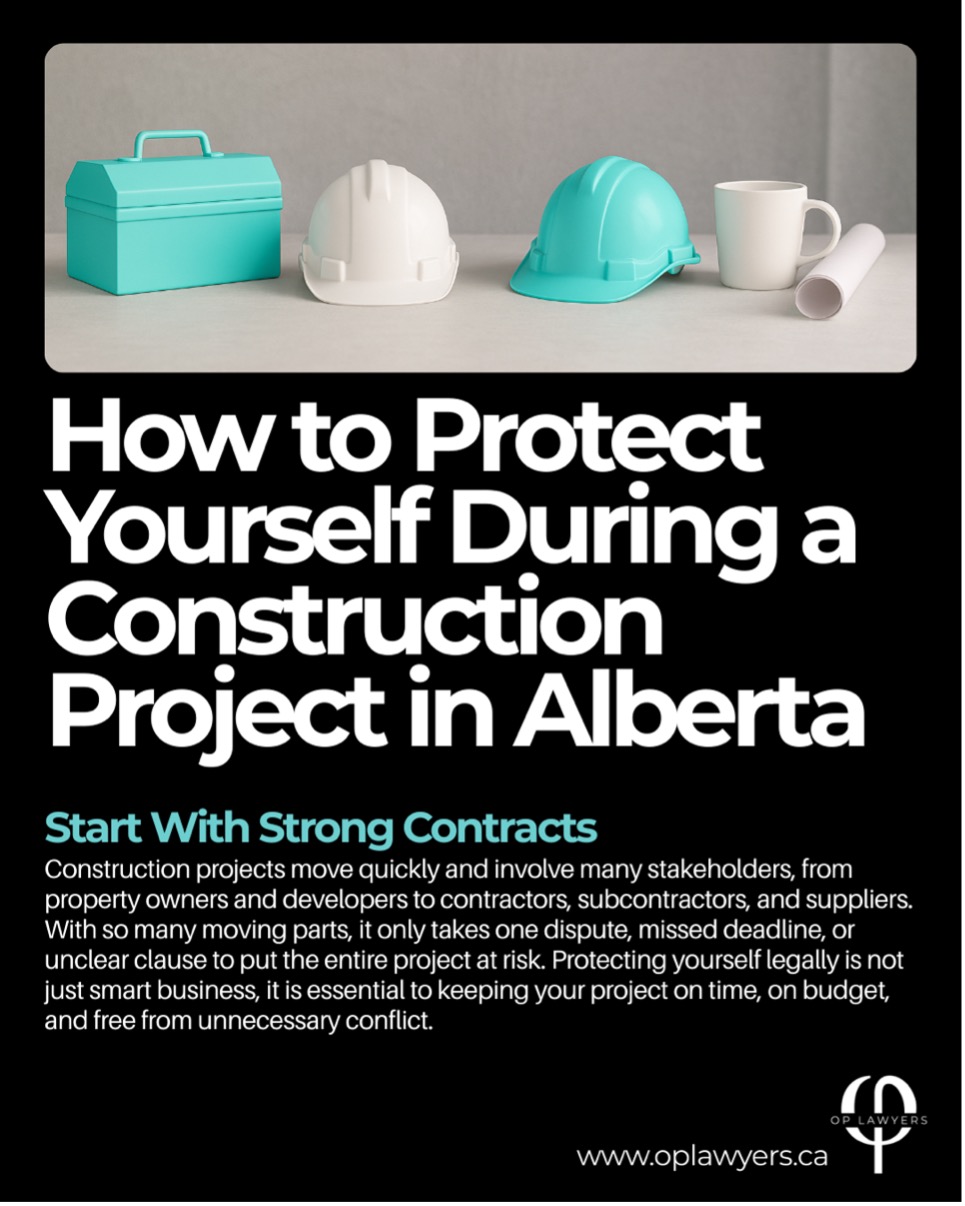Construction projects move quickly and involve many stakeholders, from property owners and developers to contractors, subcontractors, architects, and suppliers. With so many moving parts, it only takes one dispute, missed deadline, or unclear clause to put the entire project at risk. Protecting yourself legally is not just smart business, it is essential to keeping your project on time, on budget, and free from unnecessary conflict.
This blog explores the key steps you can take to reduce risk, comply with Alberta legislation, and safeguard your rights throughout a construction project.
Start With Strong Contracts in Alberta
A well-drafted contract is the foundation of any successful construction project. In Alberta, the Prompt Payment and Construction Lien Act (formerly known as the Builders’ Lien Act) makes clear and enforceable contracts more important than ever.
Your contract should include:
• The responsibilities and scope of work for each party.
• Project timelines and clear milestones.
• Payment terms that comply with Alberta’s prompt payment requirements.
• Dispute resolution processes, including whether mediation or arbitration will be used.
• Contingencies for delays, supply chain disruptions, or scope changes.
Vague agreements often lead to disputes that cost far more to resolve than the price of obtaining legal advice at the outset. Having a lawyer review or draft your construction contract helps close loopholes, ensures compliance with the Act, and protects you if things go wrong.
Document Every Step
Construction disputes are often won or lost based on the quality of the documentation available. Memories fade and verbal agreements can be misinterpreted, but written and photographic records provide undeniable proof.
Best practices include:
• Keep written records of all communications, especially change orders and approvals.
• Maintaining daily site reports, logs, and progress updates.
• Saving invoices, receipts, and payment confirmations.
• Photographing site conditions and completed work at each stage of the project.
If a payment dispute or performance issue arises, these records provide leverage for negotiation and evidence in court if litigation becomes necessary.
Understand Your Rights Under Alberta Law
Alberta’s Prompt Payment and Construction Lien Act governs construction projects in the province. It was designed to create more fairness and efficiency in the industry by ensuring workers and contractors are paid on time, while also giving owners clear rights when disputes arise.
Key protections under the Act include:
Builders’ Liens
If you are not paid for your work or materials, you may file a lien against the property. This creates a legal claim that can prevent the property owner from selling or refinancing until the debt is resolved. Strict timelines apply:
- In most cases, you must file your lien within 45 days of completing the work or providing the materials.
- For projects involving oil and gas wells and well sites, the timeline is 90 days.
Because these deadlines are absolute, acting quickly is essential.
Holdbacks
Owners are required to retain a 10 percent holdback from each progress payment. This holdback provides security in case lien claims are filed and ensures funds remain available to pay subcontractors or suppliers who were not paid by the contractor.
Prompt Payment Requirements
Invoices must be properly issued, reviewed, and paid within strict timelines. Typically, an owner has 14 days to dispute an invoice, and if no dispute is raised, payment must be made within 28 days. These rules help reduce the chronic problem of payment delays across the construction chain.
Failure to comply with these timelines can expose parties to liability under the Act. Knowing your obligations and rights allows you to avoid costly mistakes.
Address Issues Early
Not every construction dispute needs to end in litigation. In fact, the earlier you address an issue, the more likely it can be resolved without significant cost or damage to relationships.
Examples of early intervention include:
• Negotiating and documenting a change order when scope adjustments occur.
• Resolving payment delays quickly by referencing the statutory timelines.
• Seeking clarification on responsibilities when overlapping trades or contractors are involved.
• Engaging in mediation or arbitration before launching a court action.
In Alberta, mediation and arbitration are increasingly used to resolve construction disputes. These methods are faster and less adversarial than litigation, while still providing enforceable outcomes.
The Cost of Not Protecting Yourself in Alberta
Failing to protect yourself legally can derail even the most promising project. Risks include:
• Non-payment for completed work or supplied materials.
• Costly project delays due to unclear responsibilities or missed deadlines.
• Litigation that consumes months or years of resources.
• Strained relationships with contractors, subcontractors, or owners that impact future opportunities.
A single unresolved dispute can outweigh the entire profit margin of a project. Prevention through strong contracts, thorough documentation, and timely legal advice is far more cost-effective than damage control after a dispute escalates.
Conclusion: Build With Confidence
Construction projects come with inherent risks, but with the right legal strategies, you can reduce uncertainty and protect your investment. Clear contracts, accurate documentation, and an understanding of Alberta’s construction laws go a long way toward keeping your project on track and avoiding unnecessary disputes.
At OP Lawyers, we understand the unique challenges of construction law in Alberta. Our team of civil litigators can help you:
• Draft and review contracts that comply with the Prompt Payment and Construction Lien Act.
• Advise you on builders’ liens, holdbacks, and payment obligations.
• Act quickly to enforce your rights if you have not been paid.
• Guide you through mediation, arbitration, or litigation when disputes arise.
If you are starting or managing a construction project in Alberta and want to safeguard your interests, contact OP Lawyers. Our team is ready to help you navigate the legal landscape, protect your rights, and ensure your project is built on a strong foundation.
Disclaimer: This blog post is intended for informational purposes only and does not constitute legal advice. For advice specific to your circumstances, please consult a qualified employment lawyer at OP Lawyers or another legal professional.
